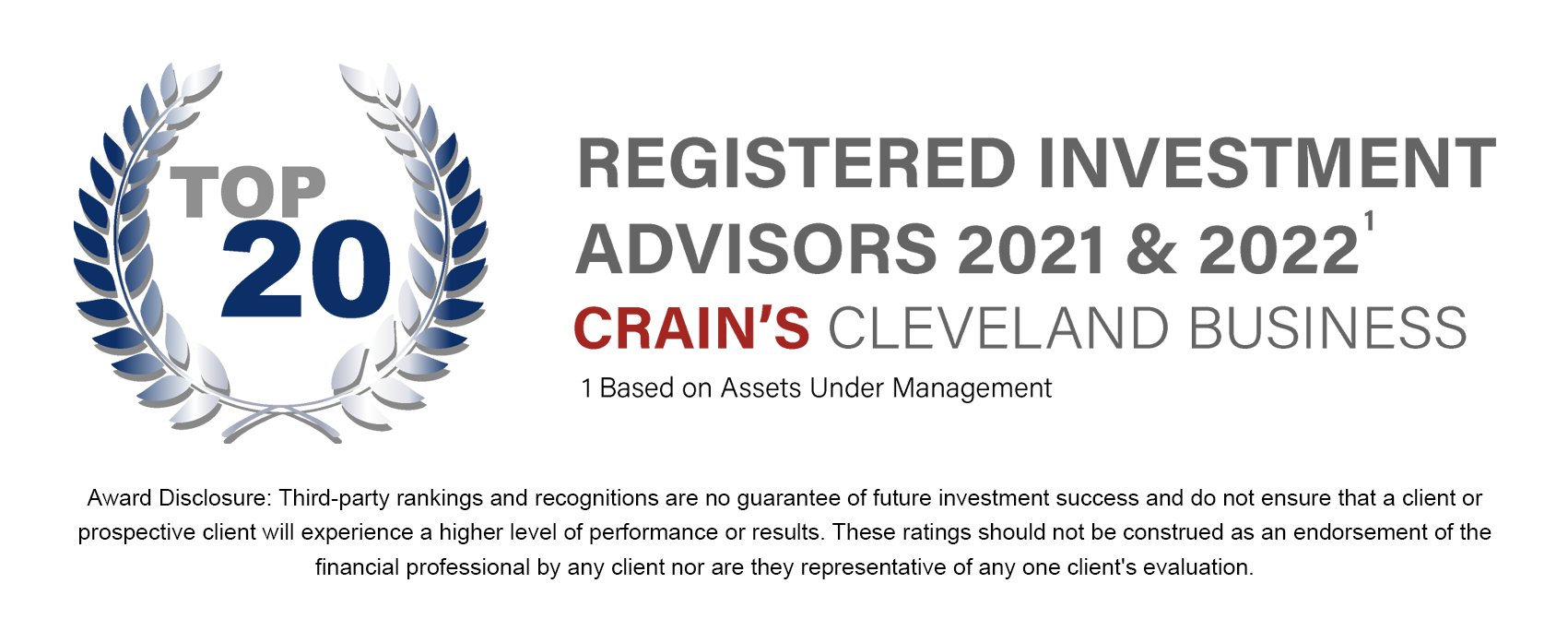Category: Commentary
2024 Review and 2025 Outlook
By Chad Roope, CFA®, Chief Investment Officer 2024 was a great year for the U.S. economy and equity markets. A strong economy, led by strong labor markets and significant investments in Artificial Intelligence, equated to double digit corporate earnings growth and thereby strong equity market performance. The U.S. was the clear economic leader globally and was why we had a strong overweight to quality, U.S. large-cap stocks all year. This overweight and our focus on active asset allocation, fundamental research and timely trade communications led to solid performance in our client portfolios in 2024, with most of our strategies strongly outperforming their benchmarks. Our proven process and seasoned team of Chartered Financial Analysts stand ready to navigate what is likely to be a dynamic environment in 2025. We think 2025 may prove to be a more volatile year given several uncertainties and rich starting valuation levels, but we think the year should prove to be a solid overall. Below are our key views: We expect U.S. outperformance compared to the rest of the world to continue amid solid economic growth, strong labor markets, lower inflation levels, a supportive Federal Reserve, and the potential for tax cuts and deregulatory policies. We continue to prefer large-cap, high quality U.S. equities as we think this is where the strongest overall earnings growth will continue to be. In fixed income, we are prioritizing higher income, shorter duration exposures t
Tuition and Student Loan Payments
Anticipation is swirling around the pending student loan forgiveness plan announced by the Biden Administration in late August. The plan can cancel up to $10,000 in debt for eligible student loan borrowers who didn’t receive a Pell Grant. If a borrower is a Pell Grant recipient, they will be eligible for up to $20,000. To be eligible, you must be a student loan borrower with a federal student loan and earned up to $125,000 of annual income (or $250,000 as a joint filer) during the COVID-19 pandemic. Here’s where the plan is so far: An exact date for applying for loan forgiveness has not been set, but the U.S. Department of Education says to expect it by early October. The initial form will be available online, with a paper version available later. The payment pause has been extended through the end of 2022, and another pause will not be coming. Interest will begin accruing again on January 1, 2023, and regular payments will resume. To receive loan forgiveness before the payment pause ends, the Department of Education recommends applying for relief before November 15. Loan servicers will send a notification when relief has been applied to an account. Borrowers should see forgiveness applied to their loan balances within four to six weeks after submission of the application. Note that borrowers with FFEL or Perkins loans not held by the Department of Education may not be able to obtain debt relief due to new guidance issued by the Depart
Lineweaver Wealth Advisors Excited To Be Part of Crain's Top Advisors Again
We are humbled and excited to share that we have been ranked in the top 20 of Crain’s Cleveland’s annual list of Registered Investment Advisors based on assets under management for the second year in a row. We were especially excited to move up on the list, after ranking in the top 25 in 2019 and 2020. While this is a great milestone and accomplishment for us, we know that there are really two reasons for it: a great staff, and client trust. Our staff work hard and go the extra mile for clients, and in turn clients trust us, use us as a valued sounding board, and introduce us to their family and friends. To us, there is no higher recognition. We also believe in personal service. We know how frustrated people are with phone trees and digital assistants where they have to answer questions and are often transferred and re-routed. We live in a fast-paced world that requires cutting-edge technology and the latest market analysis to make smart, informed decisions for all our clients. But, when it comes to service, we believe in a personal touch. You’ll always speak with a person, and we pride ourselves on getting you answers to your questions in 24 hours or less. For nearly 30 years, our team of qualified, experienced, and credentialed professionals has provided our private and corporate clients with a plethora of options for their financial needs. Our success lies in our continued commitment to providing clients with sound advice, world-class customer se
Everyone Should Have an Estate Plan in Place
It’s important to plan for the future, especially when it comes to your legacy. That conversation can be a delicate one, but nevertheless, it’s important. When you think about your final wishes and making sure they are followed, you may also be thinking of your family, friends, and loved ones, and how you want to provide for them, even in a future you can’t be part of. Having the right estate plan in place can help you do this. According to CNBC, 67% of Americans do not have an estate plan explaining they just “…haven’t gotten around to it.” In that same survey, 12% of respondents said they do not know how to get a will. A 2019 Brookdale Senior Living poll, a company that operates retirement homes across the country, showed that 40% of Americans don’t know what’s in their parents’ wills and 30% don’t know if their parents even have a will. Boston College reported that “...roughly $59 trillion will be transferred from approximately 94 million estates in America between 2007 and 2061.” Of that 59 trillion, they report that “... beneficiaries will receive $36 trillion between 2007 and 2061, and $5.6 trillion will go to federal estate taxes.” This is where we can help. At Lineweaver Financial Group and Lineweaver Wealth Advisors, we offer two different paths with a range of options to meet every need. First, we work closely aside many elder law and estate planning attorneys who can work
Protecting One of Your Largest Assets - Your Home
By John Kunze, Vice President of The Brooks & Stafford Company The real estate market has been crazy these last two years. Many of the home values in our area have increased 25% or more. The cost of building a new home has seen similar increases. There are many reasons, including a limited supply of homes for sale, lower interest rates, increased cost of building materials, shortage of skilled labor in the building trades, etc. But, what if there was a terrible loss to my home? Do I have enough insurance? Is my home properly protected? Understanding your insurance policy will help you protect your home in the way that is best for you. Homeowner’s policies use a Replacement Cost as the basis of coverage and claim valuation. Replacement cost is the cost to repair or replace the damage to your home without any deduction for age or depreciation, not the cost you could sell your home. Make sure your policy is Replacement Cost contract and not an Actual Cash Value policy. Your insurance agent or company should be able to help you determine a fairly accurate estimate of your home’s Replacement Value. Once that is determined, make sure your agent includes a provision that each year changes your Dwelling Limit to coincide with the change in the new building costs – many companies call that “Inflation Guard Protection”. How do I protect against a huge increase in my home’s valuation during the policy
Is Breakfast Really The Most Important Meal of the Day?
Breakfast is often described as the most important meal of the day, but is skipping this morning meal really detrimental to health? Newer research suggests this may not be as bad as many of us believe. In this Honest Nutrition feature, we take an in-depth look at breakfast and whether skipping it is really harmful. Though around 15% of people in the United States regularly skip breakfast, many still believe it to be the most important meal of the day. Breakfast provides the body with important nutrients to start the day feeling energized and nourished. Many also believe that it can promote weight loss. But is breakfast really the most important meal of the day? Most of the claimed benefits of eating breakfast are primarily derived from observational studies, which cannot prove cause and effect. For example, one 2021 systematic review of 14 observational studies found that those who eat breakfast seven times per week have a reduced risk for: heart disease diabetes obesity high blood pressure stroke abdominal obesity cardiovascular-related death elevated low-density lipoprotein (LDL) cholesterol. Should You Eat Breakfast? Because breakfast gives us the opportunity to fuel our body with nutrients, it is an important meal. However, according to recent studies, it may not be the most important meal of the day. Eating breakfast and listening to your hunger cues are very important if you wake up hungry in the morning. However, if you get busy and skip breakfast one day, there
Understanding Student Loans
Student loans are a great investment when continuing your education so it’s important to know the different kinds that are available and the strategies for dealing with them. According to data from Lendingtree.com, more than 2/3rds of graduates – from both public and private institutions – have student loans and it’s something that affects many Americans. For parents and grandparents of current college students, there are a few different kinds of student loans to understand. These fall into four categories: Subsidized, Unsubsidized, PLUS loans, and private loans. When it comes to Federal loans, there are essentially three kinds. Subsidized are only applicable to undergraduates with demonstrated financial need. Unsubsidized loans are not tied to financial need, and are available to all undergraduate, graduate, and professional students. PLUS loans are available for graduate and professional students, as well as the parents of dependent undergrads. Subsidized and unsubsidized federal student loans don’t require a credit check, and you are able to secure them simply by signing a form indicating that you will pay them back. However, PLUS loans and private loans will require a credit check. Private loans come from banks and other financial institutions who lend directly to students and their families. These are similar to any private loans, in that they’ll require a credit check, and the lender will want to see proof that you are
The Power of Dividends Part II: Bank Preferreds
As we all deal with continued market volatility, inflation, and other economic headwinds, qualified dividends can be a great strategy for your portfolio. This is the second in a two-part series discussing possible dividend strategies. So, what are the main benefits we can expect from qualified dividends? There are three things you should consider when adding qualified dividends to your portfolio. First, they can be a major contributor to total return. Second, you need to carefully vet the quality. And third, they can have very beneficial tax treatment. There are many types of dividend-paying stocks, but there are two that are particularly timely: bank preferred shares, and oil and gas exploration and production. Last week, we discussed Oil and Gas E & P, and we know from the number of calls we received, that many people were interested. This week, we’ll talk more about bank preferreds. These are particularly timely as a strategy because many banks are flush with cash as a result of the stringent regulations after the financial crisis of 2008. These are currently attractively priced, and let you lock in your yield for at least 5 years – but possibly much longer. That doesn’t mean your money is tied up though because they can be sold any time. And preferred shares typically decline in price as interest rates rise, so substantial discounts are already available. When you purchase at a discount to par, your total return
The Power of Dividends Part I: Oil and Gas
As we all deal with continued market volatility, inflation, and other economic headwinds, qualified dividends can be a great strategy for your portfolio. This is the first in a two-part series discussing possible dividend strategies. So, what are the main benefits we can expect from qualified dividends? There are three things you should consider when adding qualified dividends to your portfolio. First, they can be a major contributor to total return. Second, you need to carefully vet the quality. And third, they can have very beneficial tax treatment. There are many types of dividend-paying stocks, but there are two that are particularly timely: bank preferred shares, and oil and gas exploration and production. The first thing to understand about oil and gas E&P is that these are really just common shares of U.S. or Canadian gas and energy production companies. Many of these companies paid down debt substantially in the last 5 years, have reduced well costs, and have a break-even price with West Texas Intermediate, or WTI at $30-$35 a barrel. And as all of us know who have bought gas recently, it’s significantly more than that! These are generating significant free cash flow right now, which won’t surprise most of us who have been to the gas pump recently. But many companies have committed to use this excess cash flow to reward shareholders by raising base dividends, and some are even adding a variable dividend based
What Do Events In Ukraine Mean For Your Portfolio?
U.S. stock markets have been declining since the beginning of January and fell further into correction territory after the Russian invasion, though markets recovered from their lowest levels since then. During this correction, the S&P 500 declined nearly 15% from peak to trough, while the Russell 2000 Index and the Nasdaq Composite both briefly entered bear market territory (down 20% or more). While we recognize that the current geopolitical landscape in Eastern Europe remains highly uncertain, we believe history may be a reasonable guide for what to expect from financial markets. If history is any guide – and by history, we mean Iraq’s invasion of Kuwait and N. Korea’s invasion of S. Korea, since these are the most recent and similar events - financial markets tend to peak before the actual conflict date, as tensions rise, and the overall S&P 500 decline has historically been 14-21%. Therefore, equity markets may have more downside in the short term, but we may be closer to the end of this correction than the beginning, based on current geopolitical circumstances. However, we do expect financial markets to continue to experience heightened volatility in the short term. In our experience, sometimes individual investors tend to make emotional and often irrational decisions during periods of financial market volatility. Your emotions in situations like these can be your greatest enemy when it comes to making the right financial






















 Virteom
Virteom